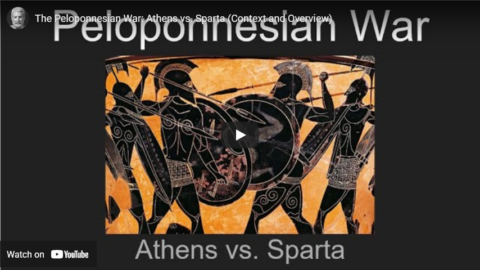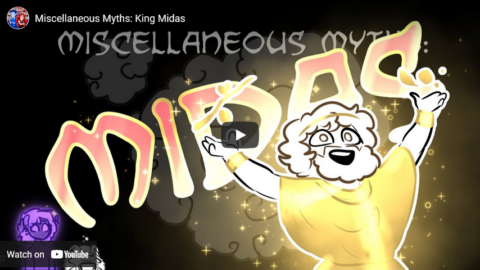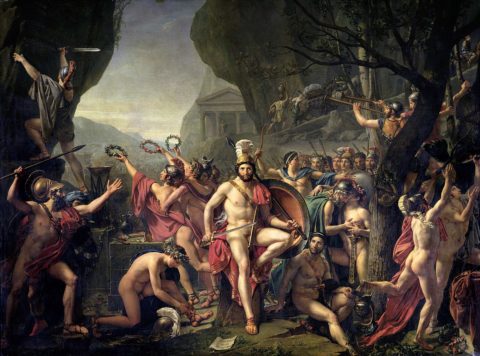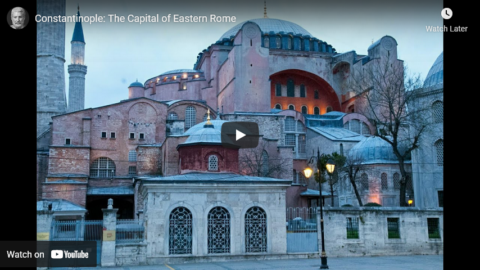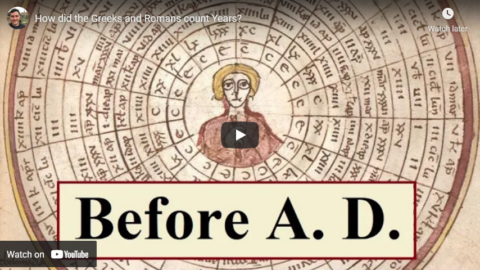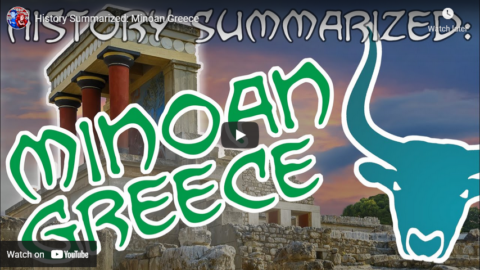World War Two
Published 17 Feb 2022It’s 1943, the preparations for D-Day have already begun: deceive the Wehrmacht. Here at TimeGhost, we have begun to prepare our D-Day for 2023, and we want you to join us! Find out how in the pinned comment.
(more…)
February 21, 2022
D-Day – The Biggest Trick in History – WW2 Special
February 11, 2022
The Peloponnesian War: Athens vs. Sparta (Context and Overview)
Thersites the Historian
Published 28 Oct 2021In this lecture, I cover Greek history from 478-404 BCE with an emphasis on the Peloponnesian War. This is intended as a primer on the topic and I devote more time to establishing the context and causes of the war than I do going through the details of conflict itself.
Patreon link: https://www.patreon.com/thersites
PayPal link: paypal.me/thersites
Discord: https://discord.gg/QCaXXFr
Brave Browser: https://brave.com/noa557
Twitter link: https://twitter.com/ThersitesAthens
Minds.com link: https://www.minds.com/ThersitestheHis…
Steemit/dtube link: https://steemit.com/@thersites/feed
BitChute: https://www.bitchute.com/channel/jbyg…
February 10, 2022
QotD: Classical Greek Polis governance
Before we dive in, I want to give a brief primer on the basics of how nearly all Greek poleis – Athens, Sparta, Corinth, Thebes, Plataea, Tegea, whatever – are structured, because it’ll help in understanding Sparta. (Reminder: the polis, sometimes called a city-state, is the basic unit of Greek governance – these are all independent micro-states).
The standard ingredients of a Greek polis are an assembly of all adult citizen males (often called an ekklesia, meaning “assembly”), a smaller advisory committee (frequently called a boule), and then a set number of elected officials who carried out the laws of the other two (magistrates). I’ve given the common names for these components, but they often have different names in different poleis.
Those basic units don’t change from a democracy (like Athens) to an oligarchy (like Corinth) or even a tyranny (like Syracuse) – the type of government just reflects the division of power between them, and the method of selection. In a democracy, like Athens, the ekklesia will have most of the power, being able to overrule the boule or the magistrates. Often the members of the boule can come from a wide range of wealth classes or even be randomly selected.
In an oligarchy, power is generally focused in the magistrates – drawn from the upper-crust of society – and a smaller boule, with the ekklesia having much less power to restrain them. Alternately, the ekklesia may be restricted in size to only a wealthy subset of the citizenry. In a tyranny, a single person (the tyrant) is able to gain control of the system, through a mix of demagoguery, charisma and well-placed cronies. Even under a tyranny, the basic three-part system still exists, it is simply subverted and controlled by one person (much like how some modern dictatorships have all of the institutions of a democracy – courts, elections, etc – but all of the power is still in one set of hands and the elections are shams).
I want to note this up front because it is important to recognize that the existence of a popular assembly does not make a Greek polis a democracy, nor does the existence of a powerful magistrate make it a tyranny. As we’ll see, Sparta has an assembly, it is just laughably weak; it also has two very powerful magistrates, but their power is strongly checked. What matters is the division of power between these parts. I also wanted to start here because Sparta follows this basic model, but with some interesting variations. Knowing what the normal model looks like will make it easier to spot the variations that are unique to Sparta.
Bret Devereaux, “Collections: This. Isn’t. Sparta. Part V: Spartan Government”, A Collection of Unmitigated Pedantry, 2019-08-29.
February 8, 2022
Roman Republic to Empire: 01 Mistress of the Mediterranean
seangabb
Published 21 Jan 2021[Update 2023-03-02 – Dr. Gabb took down the original posts and re-uploaded them.]
In 120 BC, Rome was a republic with touches of democracy. A century later, it was a divine right military dictatorship. Between January and March 2021, Sean Gabb explored this transformation with his students. Here is one of his lectures. All student contributions have been removed.
(more…)
January 29, 2022
Miscellaneous Myths: King Midas
Overly Sarcastic Productions
Published 22 Oct 2021Ahh, Midas. Shockingly one of the least Problematic ancient greek kings, and certainly one of the funniest to read about. Bizarrely good at surviving direct confrontations with temperamental gods!
PARTIAL TRACKLIST: Starfall, Flight of the Silverbird, Sky Becomes Water, Starfall
“Sneaky Snitch” Kevin MacLeod (incompetech.com)
Licensed under Creative Commons: By Attribution 3.0
http://creativecommons.org/licenses/b…Our content is intended for teenage audiences and up.
PATREON: https://www.Patreon.com/OSP
PODCAST: https://overlysarcasticpodcast.transi…
DISCORD: https://discord.gg/osp
MERCH LINKS: http://rdbl.co/osp
OUR WEBSITE: https://www.OverlySarcasticProductions.com
Find us on Twitter https://www.Twitter.com/OSPYouTube
Find us on Reddit https://www.Reddit.com/r/OSP/
January 28, 2022
Spartan glossary
As part of a multi-post series at A Collection of Unmitigated Pedantry on explaining (and debunking) the modern day mythology of classic-era Sparta, Bret Devereaux compiled a useful glossary of terms that will be of use as I’ll be excerpting several sections of his series for today’s and several future QotD entries. I’ve added a few entries that seem necessary and expanded some others, but these are enclosed in square brackets “[ ]” to show they’re not directly from Bret’s original post.
Acclamation. A vote held by acclamation (sometimes called a “voice vote”) is a vote where, instead of getting an exact count of yes and no votes, the outcome is judged by the volume of people calling out yes or no. Obviously it would be very hard to tell who had really won a close vote. This is used in modern democracies only for very lopsided (typically unanimous) votes; in Classical Sparta, this was the only voting system, votes were never counted.
[Agoge. The Spartan education system for boys (ἀγωγή, pronounced ah-go-GAY). “Spartan boys were, at age seven, removed from their families and grouped into herds (agelai) under the supervision of a single adult male Spartan – except for the heirs to the two hereditary kings, who were exempt. Order was kept by allowing the older boys to beat and whip the younger boys (Xen. Lac. 2.2). The boys were intentionally underfed (Plut. Lyc. 17.4; Xen. Lac. 2.5-6). They were thus encouraged to steal in order to make up the difference, but severely beaten if caught (Plut. Lyc. 17.3-4; Xen. Lac. 2.6-9). … We are not told, but it seems unavoidable that in a system that intentionally under-feeds groups of boys to force them to steal, that the weakest and smallest boys will end up in a failure spiral where the lack of food leads to further weakness and further victimization at the hands of other boys. I should note that while ancient parenting and schooling was certainly more violent than what we do now – the Spartan system was recognized as abnormally violent towards these boys, even by the standards of the time.”]
Apella. The Apella was the popular assembly of Sparta, consisting of all adult male Spartiates over the age of thirty. The Apella was presided over by the Ephors and all votes were by acclamation. The Apella did not engage in debate, but could only vote “yes” or “no”. The Gerousia had the power to ignore the decisions of the Apella. [In most other Greek poleis the equivalent body would be called the ekklesia.]
Ephor. The Ephors were a board of five officials in Sparta, elected annually by the Apella (technically plus the two kings). The Ephors oversaw the two hereditary Spartan kings and could even bring a king up on charges before the Gerousia. In practice, the Ephors – not the kings – wielded the most political power in Sparta. The Ephors were also responsible for ritually declaring war on the helots every year. The institution as a whole is sometimes collectively referred to as the Ephorate.
Gerousia. The Gerousia – literally a council of old men (the members were “Gerontes” – literally “old men”) which consisted of thirty members, 28 elected (by acclamation in the Apella) plus the two hereditary kings. The elected members all had to be over the age of 60. Gerontes were elected for life. The Gerousia decided what motions could be voted on by the Apella and had the power to cancel any decision of the Apella. It also functioned as a court, with the power to try Spartiates and even the kings. In practice, with the Ephors, the Gerousia wielded the real political power in Sparta.
Helot. The subjugated slave class of Sparta, which made up the overwhelming majority of its residents, the Helots did the agricultural labor which kept the Spartan state running. Helots can be further subdivided into the Laconian helots (those living in Sparta proper) and the Messenian helots (the populace of Messenia which had been reduced to helotry after being conquered by Sparta in the 7th century B.C.). Helots often fought in Sparta’s armies, apparently as screening light-infantry forces (and also as camp followers and servants).
Homoioi. See: Spartiates.
Hoplite. Hoplites were Greek heavy infantry soldiers who fought with a heavy round shield (sometimes called a “hoplon” but more correctly an “aspis“) and a spear, typically in armor.
Hypomeiones. One of several sub-citizen underclasses in Sparta, the Hypomeiones (literally “the inferiors”) were former Spartiates who had fallen off the bottom of the Spartan social system, either through cowardice or (more likely) being unable to pay the contribution to the Syssitia. Though free, they had no role in government.
[Kings. Sparta had two royal lines and two kings at all times. The kings were drawn from the Agaids and the Eurypontid families. In theory, both kings had the same set of powers. The kings’ wealth was derived from lands allocated from territory taken from the perioikoi, and the eldest son of the current king in each line was the presumptive heir. On this basis, the kings were almost always the two wealthiest men in Sparta.]
[Kleroi (sing. kleros). The (theoretically) equal plots of land allocated to each Spartiate, worked on his behalf by Helots to generate the contributions to the individual Spartiate‘s Syssitia. Up to half of the production of the kleros had to be paid to the Spartiate by the Helots who worked that land. At some point, the kleroi became inheritable property, which facilitated the accumulation of wealth in fewer and fewer hands, contributing to the demographic collapse of the Spartiate class.]
Lycurgus. [The name of the (almost certainly) mythical founder figure of Sparta.] Lycurgus had been the younger brother of one of Sparta’s two kings, but had left Sparta to travel when his brother died, so that he would be no threat to his young nephew. After a time, the Spartans begged Lycurgus to come back and reorganize society, and Lycurgus – with the blessing of the Oracle at Delphi – radically remade Spartan society into the form it would have for the next 400 years. He did not merely change the government, but legislated every facet of life, from child-rearing to marriage, to the structure of households, the economic structure, everything. Once he had accomplished that, Lycurgus went back to Delphi, but before he left he made all the Spartans promise not to change his laws until he returned. Once the Oracle told him his laws were good, he committed suicide, so that he would never return to Sparta, thus preventing his laws from ever being over turned. So the Spartans never changed Lycurgus’ laws, which had been declared perfect by Apollo himself. Subsequently, the Spartans accorded Lycurgus divine honors, and within Sparta he was worshiped as a god.
Mothax. One of several sub-citizen underclasses in Sparta, the Mothakes were non-citizen men, generally thought to have been the children of Spartiate fathers and helot mothers, brought up alongside their full-citizen half-siblings. Mothakes fought in the Spartan army alongside spartiates, but had no role in government. A surprising number of innovative Spartan commanders – Gylippus and Lysander in particular – came from this class.
Neodamodes. One of several sub-citizen underclasses in Sparta, the Neodamodes were freed helots, granted disputed land on the border with Elis. Though they served in the Spartan army, the Neodamodes lacked any role in government. We might consider the helots who served in Brasidas’ army, the Brasideioi as a type of the Neodamodes (they did settle in the same place).
Peers: See: Spartiates.
Perioikoi (sing. Perioikos). The perioikoi (literally the “dwellers around”) were one of several sub-citizen underclasses in Sparta. The perioikoi were residents of communities which were subjected to the Spartan state, but not reduced to helotry. They lived in their own settlements under the control of the Spartan state, but with limited internal autonomy. The perioikoi seem to have included Sparta’s artisans, producing weapons, armor and tools; they were also made to fight in Sparta’s armies as hoplites.
Polis (pl. poleis). A complicated and effectively untranslatable term, polis most nearly means “community” and is often translated as “city-state”. However, there were poleis in Greece without cities (Sparta being one – a fact often concealed by translators rendering polis as city). Instead a polis consists of a body of citizens, their state, and the territory it controls (including smaller villages but not other subjugated poleis), usually but not always centered on a single urban center. Poleis are almost by definition independent and self-governing (that is, they have eleutheria and autonomia).
Skiritai. The Skiritai were one of several sub-citizen underclasses in Sparta. Dwellers in Skiritis, the mountains between Laconia and Arcadia, they were mostly rural people who were free, but subject to the Spartan state, similar to the perioikoi. The main difference between the two was that the Skiritai – perhaps because of their mountainous homes – served not as hoplites, but as an elite corps of light infantry in the Spartan army.
Spartiates, also called peers or homoioi. The citizen class at Sparta, the Spartiates were a closed ethnic aristocracy. Membership required both a Spartiate father and a Spartiate mother, as well as successful completion of the Agoge and membership in a Syssitia. Spartiate males over thirty were the only individuals in Sparta who could participate in government, although the political power of the average Spartiate was extremely limited.
Syssitia (sing. syssition). The Syssitia were the common mess-groups into which all adult Spartiates were divided. Each member of the Syssitia contributed a portion of the mess-group’s food; the contribution was a condition of citizenship. Spartiates who could not make the contribution lost citizenship and became Hypomeiones.
QotD: The Myth of Spartan Equality
This idea – the degree of equality and cohesion – is what I prefer to call the Myth of Spartan Equality, and it’s going to be our target today.
Where does this idea come from? Well, it comes from the same pro-Spartan sources we discussed last time. Plutarch claims that Lycurgus‘ decision to banish money from Sparta essentially removed greed by making all of the Spartans equal (Plut. Lyc. 9.1-4) – or equally poor – though we should note that Plutarch is writing 900 years after Lycurgus (again, probably not a real person) was supposed to have lived. Xenophon notes approvingly that Lycurgus forbade the Spartans from engaging in productive business of any kind, making them thus unable to accumulate wealth (Xen. Lac. 7.1-6). Land was supposed to be distributed equally to each full Spartan citizen – the spartiates or homoioi (we’ll define these terms in a second) in equal plots called kleroi.
This idea – the Myth of Spartan Equality – is perhaps the single “biggest idea” in the conception of the Spartan state, rivaled only by the myth of Spartan military excellence (don’t worry, we’ll get there!). There is something deeply appealing, at a bedrock emotional level, to the idea of a perfectly equal society like that. And that myth of equality has prompted all sorts of thinkers from all sorts of eras (Rousseau, most famously) – including our own – to be willing to look past Sparta’s many, many failings.
And on the face of it, it does sound like a very equal society – practically a collectivist utopia. It is a pleasant vision. Unfortunately, it is also a lie.
[…] every Greek polis had a three-level layer-cake of status: the citizen body, free non-citizens (like foreigners), and non-free persons (slaves). You could – and the Greeks did – divide that top group by wealth and birth and so on, but we’ll get to that a bit later in this post and the next. For now, let’s stick with the three-level layer cake. Sparta follows this scheme neatly.
At the top were the Spartiates, the full-citizen male Spartans. According to Herodotus there were once 8,000 of these (Hdt. 7.234.2); supposedly 9,000 based on the initial number of equal land plots (kleroi) handed out (Plut. Lyc. 8.3 – or rather than saying “handed out” we might say “seized”). Of course these are tallies of Spartiate males, but women could be of citizen stock (but not citizens themselves) and we ought to imagine an equal number of spartiate women at any given time. For a child to be born into the citizen class (and thus eligible for the agoge and future full citizenship), he had to have a citizen father and a citizen mother. We’ll deal with the bastards a bit further down. Also, the spartiates were often also called the homoioi, sometimes translated as “peers” but literally meaning something like “the equals”. As we’ll see, that equality is notional at best, but this ideal of citizen equality was something Sparta advertised about itself.
[…]
But the final word on if we should consider the helots fully non-free is in their sanctity of person: they had none, at all, whatsoever. Every year, in autumn by ritual, the five Spartan magistrates known as the ephors declared war between Sparta and the helots – Sparta essentially declares war on part of itself – so that any spartiate might kill any helot without legal or religious repercussions (Plut. Lyc. 28.4; note also Hdt. 4.146.2). Isocrates – admittedly a decidedly anti-Spartan voice – notes that it was a religious, if not legal, infraction to kill slaves everywhere in Greece except Sparta (Isoc. 12.181). As a matter of Athenian law, killing a slave was still murder (the same is true in Roman law). One assumes these rules were often ignored by slave-holders of course – we know that many such laws in the American South were routinely flouted. Slavery is, after all, a brutal and inhuman institution by its very nature. The absence of any taboo – legal or religious – against the killing of helots marks the institution as uncommonly brutal not merely by Greek standards, but by world-historical standards.
We may safely conclude that the helots were not only enslaved persons, but that of all slaves, they had some of the fewest protections – effectively none, not even protections in-name-only.
Bret Devereaux, “Collections: This. Isn’t. Sparta. Part II: Spartan Equality”, A Collection of Unmitigated Pedantry, 2019-08-23.
January 15, 2022
Constantinople: The Capital of Eastern Rome
Thersites the Historian
Published 13 May 2020In this video, we look at the new capital city of the Eastern Roman Empire built by Constantine. We start out by briefly exploring the history of the Megarian colony of Byzantion and also how the city was patronized by the emperor Septimius Severus before looking at the late antique origins and medieval history of Constantinople.
Patreon link: https://www.patreon.com/thersites
PayPal link: paypal.me/thersites
Twitter link: https://twitter.com/ThersitesAthens
Minds.com link: https://www.minds.com/ThersitestheHis…
Steemit/dtube link: https://steemit.com/@thersites/feed
BitChute: https://www.bitchute.com/channel/jbyg…
January 5, 2022
Spartan BLACK BROTH | Melas Zomos
Tasting History with Max Miller
Published 6 Oct 2020If you’ve ever wanted to be a Spartan warrior, then making a bowl of Melas Zomos is just a part of the process. Today, I cover each step in making both Melas Zomos and in making a Spartan warrior.
Follow Tasting History here:
Instagram: https://www.instagram.com/tastinghist…
Twitter: https://twitter.com/TastingHistory1
Reddit: r/TastingHistoryHelp Support the Channel with Patreon: https://www.patreon.com/tastinghistory
LINKS TO INGREDIENTS & EQUIPMENT**
Canon EOS M50 Camera: https://amzn.to/3amjvwu
Canon EF 50mm Lens: https://amzn.to/3iCrkB8
All-Clad Stock Pot: https://amzn.to/32HsYMx
Bay Leaves: https://amzn.to/33DnaTP
KitchenAid Blender: https://amzn.to/2RBkWi4LINKS TO SOURCES**
The Spartans by Paul Cartledge: https://amzn.to/35Jd2vo
Plutarch On Sparta: https://amzn.to/2H6SBhy
The Deipnosophistai by Athenaeus: https://amzn.to/3my5v8D
The Histories by Herodotus: https://amzn.to/32NdcQF
A Companion to Sparta by Anton Powell: https://amzn.to/3c94PSq
The Rise of the Greek Aristocratic Banquet by Marek Wecowski: https://amzn.to/2RFD5LK
Sparta Reconsidered by Helena P. Schrader: https://bit.ly/32FQOIM**Amazon offers a small commission on products sold through their affiliate links, so each purchase made from this link, whether this product or another, will help to support this channel with no additional cost to you.
MELAS ZOMOS
INGREDIENTS
– 2lb (1kg) Pig Leg (or other pork product)
– 2 Cups (1/2 liter) Pig Blood
– 1 Cup (235ml) White Wine Vinegar
– 2 Tablespoons Olive Oil
– 1 Tsp Salt
– 4 Cups (1 Litre) Water
– 3 Bay Leaf
– 1 Large Chopped OnionMETHOD
1. Set a large stock pot over medium heat, then add the olive oil and onions and cook until tender and lightly brown, about 10 minutes.
2. Add the chopped pork to the pot book for another 10 minutes.
3. Pour in the vinegar and 3-4 cups of water (4 if you have fresh pig’s blood, 3 if you have coagulated blood), the salt and the bay leaves. Once boiling, lower the heat to medium low and let the soup simmer, covered, for 45 minutes to and hour or until the pork is cooked through.
4. Add the pork blood* and simmer for 15 minutes more, then serve.
*If you are using coagulated pork blood, mix it with the final cup of water in a blender and blend until most of it is liquid. Strain out any large chunks and add the liquid to the soup.PHOTO CREDITS
Symposium Scene: Marie-Lan Nguyen / https://bit.ly/3muYyoI
Schwarzsauer: Overbergderivative work / https://bit.ly/2ZJxBUq
Dinuguan with puto: Lambanog / https://bit.ly/3mrLyAg
Odaker: https://bit.ly/2ZKFRUi
Plutarch Bust: Odyssey / https://bit.ly/2FAYO54
Roman mosaic from Dougga: Pascal Radigue / https://bit.ly/2E6Wu4Y
Greek Vase with Child: National Archaeological Museum of Athens / https://bit.ly/2H04tlo
Sarcophagus Marcus Cornelius Statius: Louvre Museum / https://bit.ly/2ZK3bla
Dionysus with Hermes on Jug: MatthiasKabel – https://bit.ly/2FECCqL
Mt Taygetus: Gepsimos – https://bit.ly/32A4SU8
Eurotas River: Gepsimos / https://bit.ly/2Fv4AVY
Xerxes: Darafsh / https://bit.ly/2H0lWds
January 3, 2022
How did the Greeks and Romans count Years?
toldinstone
Published 31 Dec 2021The AD/CE system we use to date the year was introduced — more or less by accident — during the Middle Ages. Before its invention, the classical world used a wide range of dating systems.
Please consider supporting this channel on Patreon:
https://www.patreon.com/toldinstoneIf you liked this video, you might also enjoy my book Naked Statues, Fat Gladiators, and War Elephants: Frequently Asked Questions about the Ancient Greeks and Romans:
https://www.amazon.com/Naked-Statues-…
If you’re so inclined, you can follow me elsewhere on the web:
https://www.reddit.com/r/AskHistorian…
https://www.instagram.com/toldinstone/
https://www.goodreads.com/author/show…Chapters:
0:00 Introduction
0:51 Ancient Greek Calendars
1:42 Counting by Olympiads
2:22 The Seleucid Era
2:56 Consular Dating
3:26 Ab Urbe Condita
4:28 Indictions
4:56 Christian Chronology
5:40 Anno Domini
7:00 Conclusion
December 28, 2021
The Bubblegum History … of Chewing Gum
TimeGhost History
Published 27 Dec 2021Ancient Finns, angry Ottomans, a one-legged Mexican general, and scouring soap — that’s the story of modern chewing gum in a nutshell!
Hosted by: Indy Neidell and Spartacus Olsson
Written by: Indy Neidell
Director: Astrid Deinhard
Producers: Astrid Deinhard and Spartacus Olsson
Executive Producers: Astrid Deinhard, Indy Neidell, Spartacus Olsson, Bodo Rittenauer
Creative Producer: Maria Kyhle
Post-Production Director: Wieke Kapteijns
Edited by: Karolina Dołęga
Sound design: Marek KamińskiSources:
– Birch Bark photo courtesy of Jerzy Opioła https://commons.wikimedia.org/wiki/Fi…
– Mastic tears photo courtesy of פארוק https://en.wikipedia.org/wiki/Mastic_…
– Mexican Cession map courtesy of Kballen https://commons.wikimedia.org/wiki/Fi…
– Peter Gabriel, Chateau Neuf, Oslo, Norway courtesty of Helge Øverås https://en.wikipedia.org/wiki/File:Pe…
– Promotional Chiclets courtesy of Coolshans https://commons.wikimedia.org/wiki/Fi…Soundtracks from Epidemic Sound:
– “Ancient Saga” – Max Anson
– “Master of the Hurricane” – Rockin’ For Decades
– “Home on the Prairie” – Sight of Wonders
– “Cocktail Hour” – The Fly Guy FiveArchive by Screenocean/Reuters https://www.screenocean.com.
A TimeGhost chronological documentary produced by OnLion Entertainment GmbH.
December 27, 2021
Prince Philip was born in Greece, but was never “of Greece”
Aris Roussinos outlines the surprisingly complex history of Prince Philip’s family in Greece and explains why His Royal Highness could never really be considered Greek, despite the tabloid nickname “Phil the Greek”:

HRH Prince Philip, the Duke of Edinburgh, Colonel-in-Chief of the Royal Canadian Regiment, presenting the 3rd Battalion with their Regimental Colours, 17 April 2013. (via Wikipedia)
Though most people know that Prince Philip was born in Greece and almost immediately exiled, the precise circumstances of this leaving of his native country are surprisingly obscure. How many are aware, for example, that if Ataturk had lost the 1921 Battle of the Sakarya River, outside Ankara, not only would modern Turkey not exist, but neither would Princes Charles, William and Harry?
The existence of our future kings is the chance product of the tumult accompanying the collapse of the Ottoman Empire. It is a dramatic illustration of the Butterfly Effect, whereby random events on one corner of the European continent totally reshaped timelines on the other: indeed, we could declare the prime mover in the events that placed the Duke of Edinburgh as our Queen’s consort to be an aggrieved Greek monkey.
On 2 October, 1920, Prince Philip’s uncle, King Alexander of Greece, was taking the air in the grounds of the royal palace of Tatoi, outside Athens. His German Shepherd dog, Fritz, attacked a Barbary Macaque belonging to a member of his staff. As the King rushed to extract the screaming monkey from Fritz’s jaws, the macaque’s furious mate sunk its teeth into the king’s leg. Alexander contracted sepsis, and died just over three weeks later, throwing Greece into a succession crisis, and totally reordering the subsequent history of the Near East. As Churchill later wrote, “it is perhaps no exaggeration to remark that a quarter of a million persons died of this monkey’s bite”.
King Alexander’s septic leg, like the rest of the Greek royal family, possessed not a drop of Hellenic blood — something Prince Philip reportedly made clear to a Greek visitor to Buckingham Palace who dared to claim ethnic kinship with his host. Back when the small Balkan nation finally won its independence from the Ottoman Empire, in 1831, the European Great Powers had decided on the Bavarian Wittelsbach dynasty to rule the poor and volatile Greeks. When the Wittelsbach King Otto was forced from his throne by the revolution of 1862, the Great Powers reconvened, and chose the 17-year old Prince William of Denmark, Prince Philip’s grandfather, as Greece’s new king. As he would later instruct his children, “You must never forget that you are foreigners in this country, but you must make them [the Greeks] forget it.”
After the disastrous war against the Turks, six military leaders were tried and executed by firing squad, and Prince Philip’s father Prince Andrew, was accused of disobeying an order while in command of a Greek corps:
As the historian Michael Llewellyn-Smith noted in his excellent book on Greece’s Asia Minor campaign Ionian Vision, “whether or not Andrew had been guilty of insubordination, it was an absurd charge to bring fifteen months after the event, given that he had not been relieved of his command at the time.” On 3 December, Andrew took the stand. A staff officer, Colonel Kalogeras, stated that Andrew had refused to attack despite direct orders. Colonel Sariyannis and General Papoulas both attested that if Andrew had carried out Papoulas’ orders, the Greeks would have won the day at Sakarya. Andrew was unanimously found guilty of disobedience and abandoning his post and sentenced to be stripped of his rank and banished permanently from Greece.
Andrew expected to be executed in his cell at any moment. However, in the background, the Greek revolutionary General Nikaloaos Plastiras, a future three-time Prime Minister of Greece, had been negotiating with the British government, which had broken off formal diplomatic relations with Greece since the execution of the Six. They agreed that Andrew would be permitted to leave Greece on a British warship.
And so, a few months after his birth, Prince Philippos of Greece left Mon Repos, Corfu and Greece on the British destroyer HMS Calypso, along with his mother and father and into a life of exile. Philippos was, famously, carried onto the warship in an orange crate instead of a cot. His father Prince Andrew settled into a life of exile in France, writing a book Towards Disaster, translated by Philip’s mother Princess Alice, which aimed to justify his actions at Sakarya as necessary to avoid a pointless loss of life in a losing battle. When the monarchy was restored in Greece, Andrew refused a commission for Philip in the Hellenic Navy, saying “Never the Greek Navy! In the Greek Navy after a bit they would throw him out – that’s what they did to me, not once, as you know, or twice, but three times!”
Instead, Philip served gallantly in the Royal Navy during the Second World War, and was awarded the Greek War Cross for his actions at Cape Matapan. While his son Prince Charles became a benefactor of the Greek monastic republic of Mount Athos and frequent visitor to Corfu, and who is widely considered to be a Phillhellene with a strong mystical attachment to the Greek Orthodox faith of his grandparents, Prince Philip described himself as “a discredited Balkan prince of no particular merit or distinction”. For despite his nickname as “Phil the Greek”, he felt no great affection for the country and the uneasy crown it offered its foreign rulers. As he once said of the land of his birth and the mercurial people it contains, “I certainly never felt nostalgic about Greece. A grandfather assassinated and a father condemned to death does not endear me to the perpetrators.”
December 18, 2021
History Summarized: Minoan Greece
Overly Sarcastic Productions
Published 17 Dec 2021The classical Greeks weren’t the first kids on the Aegean block. Long before Athens’ golden age, before Homer, and even before the Trojan War, there was a civilization on the island of Krete. The land of King Minos was home to beautiful palaces, a fascinatingly-complex economy, and something approximating Bull-Cthulu. It’s a fun time, let’s jump in.
SOURCES & Further Reading: The Greeks: An Illustrated History by Diane Cline for National Geographic, The Greeks: A Global History by Roderick Beaton, Lectures from The Great Courses Plus — “Being Minoan and Mycenaean” from The Other Side of History: Daily Life in the Ancient World by Robert Garland, and “Minoan Crete” & “Schliemann & Mycenae” from Ancient Greek Civilization by Jeremy McInerney. And I have a university degree in Classical Studies.
Our content is intended for teenage audiences and up.
PATREON: https://www.Patreon.com/OSP
PODCAST: https://overlysarcasticpodcast.transi…
DISCORD: https://discord.gg/osp
MERCH LINKS: http://rdbl.co/osp
OUR WEBSITE: https://www.OverlySarcasticProductions.com
Find us on Twitter https://www.Twitter.com/OSPYouTube
Find us on Reddit https://www.Reddit.com/r/OSP/
December 8, 2021
Pandemic authoritarianism in the EU will be the death of Europe’s liberal traditions
In Spiked, Brendan O’Neill says we’re watching the “death of Europe” driven by the authoritarian instincts of government and EU leaders in thrall of public health officials:
Europe is on a precipice. It has marched, blindly, towards something very much resembling tyranny. Austria will shortly criminalise those who refuse the Covid vaccine. Germany looks set to follow. Ursula von der Leyen, president of the European Commission, is wondering out loud if every member state should do likewise and make offenders of those who reject this form of medication. In Italy you are deprived of your livelihood rather than your liberty if you say no to vaccination: the unvaxxed are not permitted to work. Anywhere. In Greece, everyone over the age of 60 must pay the government 100 euros for every month they remain unvaxxed. As if the Greek government, in cahoots with its masters in Brussels, had not immiserated Greek pensioners enough already.
Police in Rotterdam opened fire on people protesting against Covid restrictions. Three were seriously injured. Austrian cops have wielded batons and shields against the thousands who took to the streets of Vienna to say no to mandatory vaxxing. In Brussels, the black, bureaucratic heart of the EU project, water cannons and tear gas were unleashed upon citizens agitating against vaccine passes. The irony is almost too much: in the European quarter of Brussels, the very part of Europe in which the modern European sensibility was forged by politicians, experts and technocrats, ordinary people make a blow for freedom and the forces of this supposedly liberal new continent beat them down. Rarely has modern Europe’s bluster about “human rights” and “respect” been so savagely exposed.
What is happening in Europe right now is nothing short of terrifying. We are not merely witnessing another round of Covid restrictions. This isn’t just the introduction of another set of emergency measures that some people believe are necessary to stave off the latest Covid wave and the Omicron threat lurking on the horizon. No, we are living through a chilling overhaul of the entire relationship between the state and the individual, with the state empowered to such an extraordinary degree that it can now instruct its citizens on what to inject into their bodies, and the individual so politically emaciated, so denuded of rights, that he no longer even enjoys sovereignty over himself, over that tiny part of the world that is his own body and mind. We are witnessing the violent death of European liberalism and the birth pangs of a new and deeply authoritarian era.
Many seem not to recognise how serious a development mandatory vaccination is. Even those of us who are pro-vaccination, who have been happily vaxxed against Covid-19, should look with nothing less than horror upon the proposal that it should be an offence not to be vaccinated; that a citizen should be fined thousands upon thousands of euros if he refuses this treatment. One of the ideas being discussed in Austria ahead of its mandatory vax law that will be introduced in February is that citizens who refuse vaccination will be summoned to a local court. If they ignore the summons twice they will face a fine of 3,600 euros. If they continue ignoring the state’s demand that they receive medical treatment that they do not want, they’ll be fined 7,200 euros. These are life-ruining fines. There is no talk – yet – of imprisoning people who reject the vaccine, but the Austrian state is making it crystal clear that it will happily wield its power to propel the unvaxxed into destitution.
[…]
This spells the end of freedom as we know it. Bodily autonomy is the foundation stone of self-government, and self-government is the thing that gives freedom meaning. If we do not enjoy sovereignty over our minds and our flesh, then we are not free in any meaningful way. And it won’t just be the minority of people who feel forced to receive the vaccine whose freedom will suffer under this new regime of state power over people’s bloodstreams and muscles and flesh – everyone’s freedom will. The state diktat determining that only those who receive a certain form of medical treatment will get to enjoy freedom will make freedom itself contingent upon doing what the state wants you to. Even the vaxxed will not be truly free people in this world. Rather, we will be the beneficiaries of state favour, the enjoyers of small privileges, in return for our agreeing to receive an injection. We will have a license from on high to go about our daily lives. And we will know that that license could swiftly be revoked if we refuse medical treatment in the future. The redefinition of “freedom”, the making of liberty contingent upon submission to medicine, will throttle the rights of all of us – vaxxed and unvaxxed alike.
November 30, 2021
The Elgin Marbles
In The Critic, Zachary Hardman outlines the history of the Elgin Marbles and why the Greek government is re-opening the campaign to retrieve them from the British Museum:
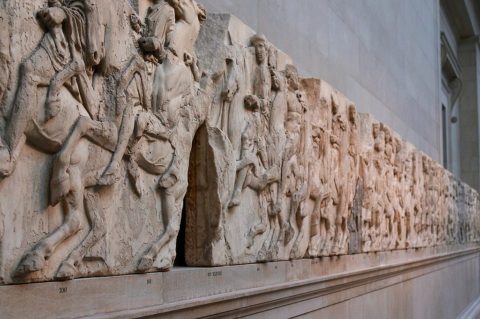
Some of the sculptures in the Elgin Marbles collection on display in the Duveen Gallery of the British Museum.
Photo by Paul Hudson via Wikimedia Commons.
Last week, the Greek Prime Minister, Kyriakos Mitsotakis was in London, with only one thing on his mind: the return of the so-called “Elgin Marbles” to Athens. 2021 is the two-hundredth anniversary of Greek independence, when the country liberated itself from the yoke of the Ottoman Empire and, for Athens, there would be no better birthday present than the restitution of the lost marbles.
The dispute about their rightful ownership is as old as the modern Greek state. In the early 19th century, the British Ambassador Lord Elgin was granted permission by Athens’ Ottoman rulers to remove half the remaining marble sculptures from a frieze on the Parthenon, the ruined ancient temple, which still adorns the Acropolis, the rocky outcrop overlooking the city.
Elgin had the marbles shipped to Britain. The journey, though, proved difficult. They were transported via Malta where, following a shipwreck, they spent a brief sojourn at the bottom of the Mediterranean Sea. The rescue mission was ruinously expensive. Elgin intended to furnish his ancestral Scottish home with the marbles. On second thoughts, though, he cut his losses and sold them to the British Museum.
Public opinion was divided. Lord Byron wrote two poems denouncing Elgin. His supporters, meanwhile, claimed the marbles were saved from further damage at the hands of warring Greeks and Turks, who didn’t appreciate them anyway. The Greeks, understandably, took a dim view of this. Since the 1980s they have waged a sustained PR offensive for the return of the marbles. An impasse, though, remains.
To break it, Mitsotakis would do well to consider the insights of the ancient rhetoricians. Athens, of course, was the birthplace of not only democracy, but rhetoric: the art of persuasion. The philosopher Aristotle, who wrote the original guidebook on the subject, said it was about identifying “the means of persuasion in any given case”. It is the task of modern Athens to work out who it must persuade and what of.
The fresh campaign began with the Government. In Downing Street, after all, lives a man Mitsotakis regards a “true philhellene”. The return of the marbles, the Greek Prime Minister said, after a meeting with Johnson, would be a “coup” for “global Britannia”. Flattery, however, has its limits. The British Government is unwavering in its support for the Museum. Mitsotakis, however, was undeterred.

